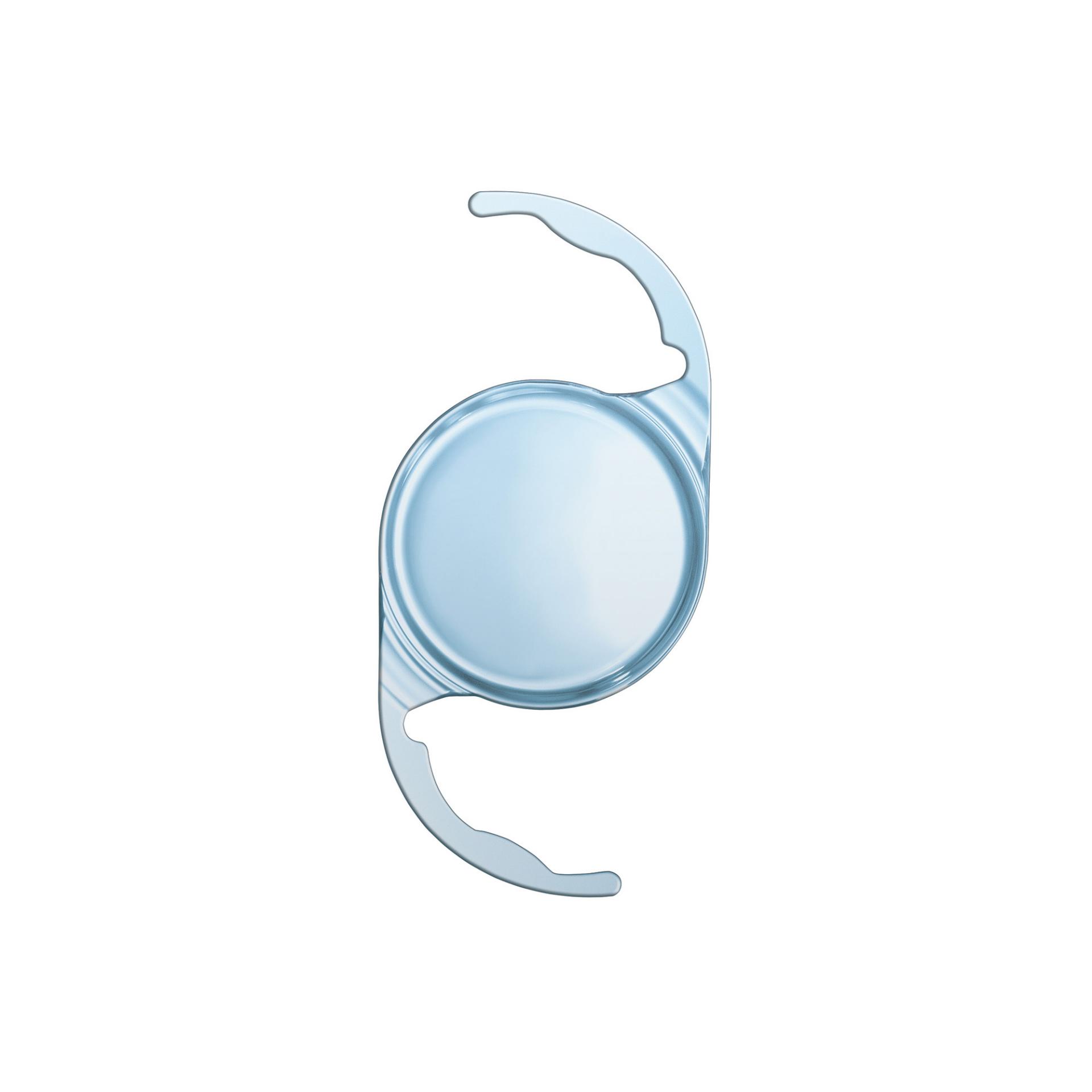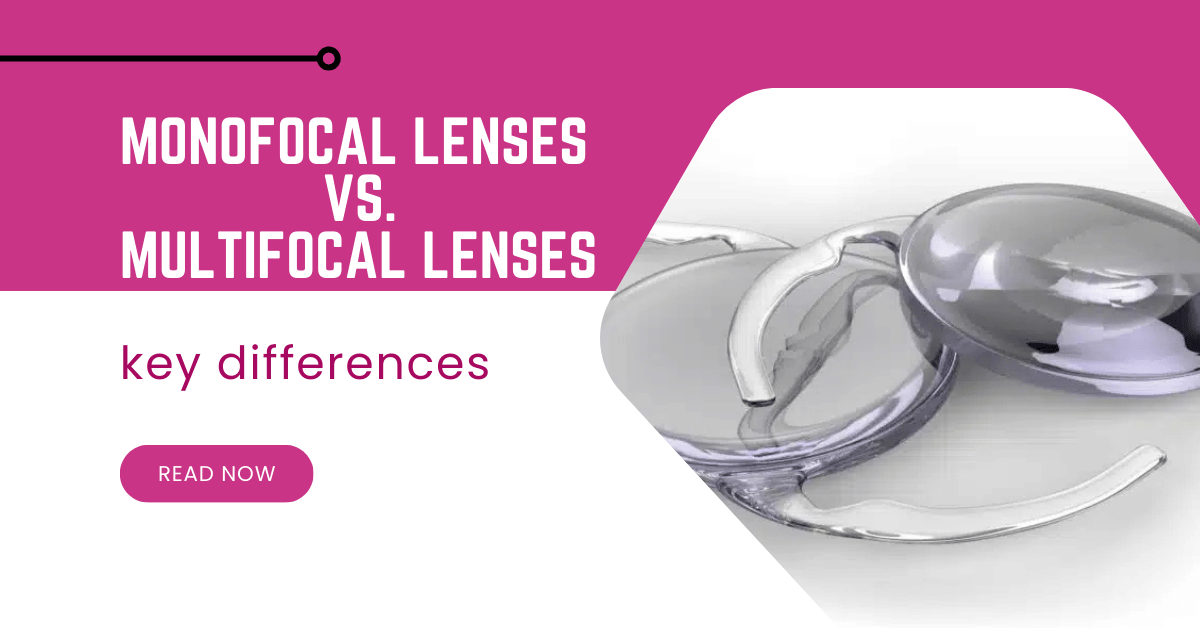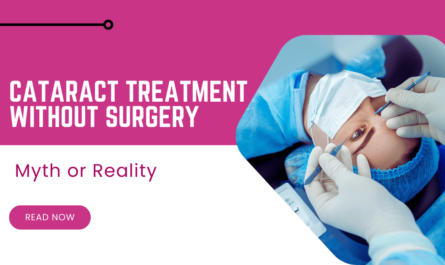Introduction
Choosing the right type of lens for vision correction can be overwhelming, especially when considering cataract surgery or refractive lens exchange. Monofocal and multifocal lenses are the two primary options, each offering unique benefits. But which one is right for you?
This blog will guide you through the key differences between monofocal and multifocal lenses, their advantages and disadvantages, and how to decide which lens suits your lifestyle and visual needs best.
Understanding Monofocal and Multifocal Lenses
What Are Monofocal Lenses?

Monofocal lenses are intraocular lenses (IOLs) that provide clear vision at a single fixed distance—near, intermediate, or far. Patients typically opt for distance vision and use reading glasses for near tasks.
What Are Multifocal Lenses?

Multifocal lenses, on the other hand, are designed to correct vision at multiple distances. These lenses reduce dependence on glasses by allowing the eye to focus on near, intermediate, and distant objects simultaneously.
Monofocal vs. Multifocal Lenses: Key Differences
1. Vision Clarity and Adjustment
- Monofocal Lenses: Provide sharp focus at a single distance but require additional glasses for other vision needs.
- Multifocal Lenses: Offer vision correction at multiple distances but may cause halos or glare, particularly at night.
2. Dependence on Glasses
- Monofocal Lenses: Most patients will need glasses for reading or close-up tasks.
- Multifocal Lenses: Reduce or eliminate the need for glasses in many cases, though some patients may still need them for certain tasks.
3. Adaptation Period
- Monofocal Lenses: Easy to adapt to, as they function similarly to natural vision correction with glasses or contacts.
- Multifocal Lenses: Require a period of adjustment as the brain learns to interpret multiple focus points.
4. Cost Consideration
- Monofocal Lenses: Generally covered by insurance as part of standard cataract surgery.
- Multifocal Lenses: More expensive and may not be fully covered by insurance.
Who Should Choose Monofocal Vs. Multifocal Lenses?
Best Candidates for Monofocal Lenses
- Those who prioritize the clearest possible vision at one specific distance.
- Individuals who don’t mind wearing glasses for certain tasks.
- People with other eye conditions such as macular degeneration or severe astigmatism.
Best Candidates for Multifocal Lenses
- Individuals who want to reduce their dependence on glasses.
- Those with an active lifestyle that requires clear vision at multiple distances.
- People who don’t have severe night vision issues or existing eye diseases.
Expert Insights from Dr. Smita Mukherjee
Dr. Smita Mukherjee is a senior ophthalmologist with more than 30 years of experience. She completed her post-graduation from Seth G.S. Medical College with academic honors and later joined the faculty of the same college. Over the years, she has gained extensive experience in all branches of ophthalmology, training several batches of post-graduate students.
Currently, Dr. Mukherjee practices at Eye Solutions Clinic, Chembur, where she specializes in Cataract, Phacoemulsification, Refractive Errors, Diabetic Retinopathy, and Age-Related Macular Degeneration.
For consultations, visit Eye Solutions Clinic, located at: 401, Pearl Belleza, D. K. Sandu Marg, 19th Road Corner, Chembur, Mumbai 400071.
FAQs
1. Can I switch from monofocal to multifocal lenses later?
- No, once an intraocular lens is implanted, it cannot be changed unless medically necessary.
2. Will I experience glare or halos with multifocal lenses?
- Some patients experience glare or halos, especially at night, but most adjust over time.
3. Do multifocal lenses work for everyone?
- They work well for many but may not be ideal for individuals with significant astigmatism or retinal conditions.
4. How do I choose between monofocal and multifocal lenses?
- Your ophthalmologist will assess your lifestyle, vision goals, and eye health before recommending the best option.
5. Are multifocal lenses covered by insurance?
- In most cases, standard monofocal lenses are covered, but multifocal lenses may require an additional out-of-pocket expense.
6. How long does it take to adjust to multifocal lenses?
- It can take a few weeks to a few months for the brain to adapt to multifocal lenses.
7. Can I drive at night with multifocal lenses?
- Yes, but some patients report halos around lights at night. If night driving is essential, discuss options with your doctor.
8. What if I am not satisfied with my multifocal lenses?
- In rare cases, lens exchange surgery can be performed, but it is a complex procedure.
Conclusion
Choosing between monofocal and multifocal lenses is a significant decision that depends on individual lifestyle, vision needs, and budget. While monofocal lenses offer clarity at one distance with minimal adaptation, multifocal lenses provide a broader range of vision with reduced dependence on glasses.
Consulting an experienced ophthalmologist like Dr. Smita Mukherjee can help you make an informed choice. Whether you prioritize crystal-clear vision at one distance or prefer the convenience of reduced dependency on glasses, there’s a lens option that’s right for you.
If you’re considering cataract surgery or lens replacement, schedule a consultation at Eye Solutions Clinic, Chembur, Mumbai, and take the first step toward better vision today!


